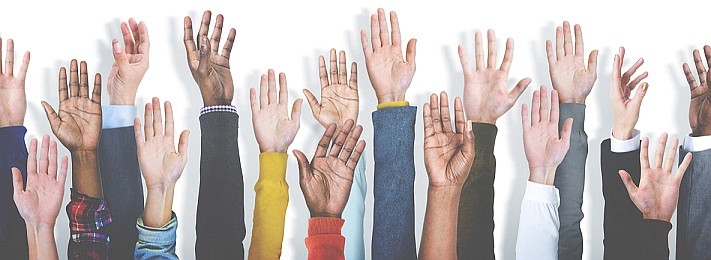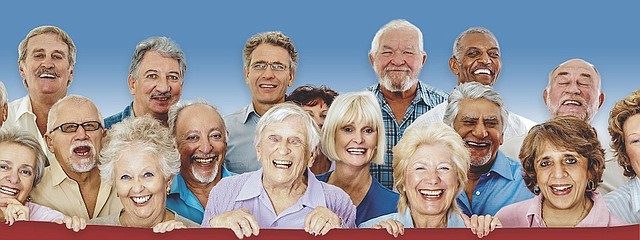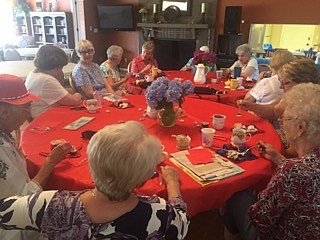Age-Friendly Discussion Groups
September 1, 2018 at 12:00 a.m.
The ongoing Age-Friendly Discussion Groups project brings you topics of interest to older adults. We look forward to hearing from your group!
The aspect of community we are exploring this month is “respect and social inclusion.” What does this mean to you?
Age Friendly Seattle, a City of Seattle initiative that is part of AARP’s national network of age-friendly communities, states that respect and inclusion are important components of its overall vision: “Everyone wants to feel valued. Age Friendly Seattle celebrates and draws upon the wisdom and experience of older adults, encourages intergenerational and multicultural understanding, and works to eliminate ageism and ensure consistent levels of high-quality service for all ages.”
The city’s action items include ensuring greater city employee awareness of aging issues; strengthening support for LGBTQ elders in Seattle; and increasing community understanding of dementia. For me, “social inclusion” is another way of saying “diversity.” Perhaps we aren’t lonely, but who are we including in our circle? There’s a fascinating book entitled The Big Sort: Why the Clustering of Like-Minded America is Tearing Us Apart, which examines the demographic trend of moving to live near others who share our beliefs. It makes sense, of course; it’s often easier and more comfortable being around people who agree with us. But what do we lose in exchange? I heard it put this way recently, “Are we a club or are we a community?” A club is where we all agree, where we’re much the same while a community has diverse viewpoints. When we do have community in that sense, how do we show respect for those with whom we differ? A book that resonates with me is, I’m Right and You’re An Idiot: The Toxic State of Public Discourse and How to Clean It Up.
My mind often considers diversity as racial and ethnic, but I’ve become more sensitized to age diversity as well. We live in a very youth-oriented society. How many times have you heard or seen the phrase “anti-aging” lately? Ageism is not just in our language, but in pervasive visual images. It’s challenging to come up with even stock photographs of a gathering of people who appear to be over the age of 50, let alone of different races. Why is that? This should not be hard; surely such gatherings occur in lots of different places yet it’s difficult to find a representational group (If your group has some photos I can use, let’s talk!).
According to a 2017 report by the Bureau of Labor Statistics, there is, indeed, ageism in hiring, unfortunately. Listening to people (especially women), ageism is not just in the workplace. Female seniors often report feeling “invisible.” For a well-documented book on this topic, read Ashton Applewhite’s This Chair Rocks, A Manifesto against Ageism or check out her TED talk or website, www.thischairrocks.com.
There’s also economic diversity. We see this in the wealth disparities of our region, such as those living in tents, while others are able to afford mansions. Where I grew up, outside of King County, the people in my everyday life were more similar to each other and I took similarities for granted. But our region is increasingly diverse, and I believe this requires efforts toward greater sensitivity.
The phrase “those people” is my personal red flag. Whenever I find myself labeling others as “those people,” it’s a cue to broaden my circle. I’ve learned there’s a new verb for this: “othering.” It means “to view or treat (a person or group of people) as intrinsically different from and alien to oneself.” Even our language of inclusion is evolving.
Age Friendly Seattle also mentions the need to increase community understanding of dementia. In the State of Washington, we are fortunate to have the Dementia-Action Collaborative, which has published the Dementia Action Roadmap Guide for Family and Care Partners. (Find this at www.dshs.wa.gov and type “dementia” in the search box. For a paper copy, please send your name and mailing address to dementiaroadmap@dshs.wa.gov or call 360-725-2545).
With respect to including LGBTQ elders, we are fortunate to have organizations such as Generations Aging with Pride (gapseattle.org, 206-393-3400).
One way of looking at our own views on respect and social inclusion is to consider the books we read. Are all of your favorite authors from one country, writing in the same language? Do the characters you resonate with represent similar backgrounds? Are they of varying ages? Every time I branch out and read a children’s book or a book meant for teens I realize how narrow my “comfort zone” of reading really is. KCLS’ “10 to Try” (www.kcls.org/10-to-try) challenge is a fun way of nudging you into unfamiliar reading territory. It encourages you to read a book in each of 10 categories that can provide new and different reading experiences (finisher prizes and a drawing await!).
In closing, I offer for contemplation these lines from Edwin Markham’s poem “Outwitted”:
He drew a circle that shut me out–
Heretic, rebel, a thing to flout.
But Love and I had the wit to win:
We drew a circle and took him in!
Discussion Questions
- How do you define “respect and social inclusion?” How does this differ from our previous topic of social participation?
- Have you ever experienced being “on the outside?” What did you do, or what did others do to either include/exclude you?
- Do you ever feel “invisible?” Share your experience with this phenomenon.
- How do you show respect to others? How do we include those with whom we don’t have a natural affinity? Can you think of a time you did so? What was the outcome of your efforts?
- In what types of gatherings do you feel most at home? Most left out?
- Do you make an effort to seek out viewpoints different from your own? Why or why not? What do you think you might learn if you did so?
SIDEBAR
Age-Friendly Discussion Groups
Do you have a group to discuss topics of interest to the 50+ crowd? Look for this feature in every issue of Northwest Prime Time, brought to you by AARP Washington, King County Library System, and Aging and Disability Services–the Area Agency on Aging for Seattle/King County.
Don’t have your own group? You are invited to participate in the monthly Kitchen Table Talks: On September 20 from 1-2pm, Age Friendly Seattle will host another lively monthly conversation about age-friendly communities. This discussion opportunity is open to all. You can call in from anywhere 206-386-1200 or toll-free 1-844-386-1200 (when prompted, enter code 6142451) or visit https://bit.ly/2wfEDB0 (when prompted, enter code 6142451). For additional information, visit www.seattle.gov/agefriendly/events or, if you have questions about this event ahead of time, call 206-386-1521.
We want your feedback!
We encourage groups to provide input on this ongoing project:
• Snap a photo of your group and post it or any comments/questions on AARP Washington’s Facebook page at www.Facebook.com/AARPWA/groups; or
• email your comments and questions to editor@northwestprimetime.com; or
• call Northwest Prime Time at 206-8248600; or
• mail us a note: Northwest Prime Time, PO Box 13647, Seattle WA 98198.
PRIZES!
Each group that contacts Northwest Prime Time by email, phone or U.S. mail will be entered to win a $100 gift card to Starbucks so you can splurge on coffee and treats for your next discussion group meeting. No cost to participate; limit one entry per month per group.
GRAND PRIZE! Each month that your group contacts Northwest Prime Time for the $100 gift card, it will automatically be entered to win the grand prize (awarded at the end of the year). The Grand Prize will be another gift card AND the exclusive Seattle-area premiere of Sy Rosen’s short film, The Matchmaker. The film is based on one of Sy’s Northwest Prime Time columns. Longtime Hollywood writer Sy will be available to speak directly to your group and answer questions about the film and his humorous take on aging.
WINNER OF GIFT CARD for their participation in a previous discussion is the Tea/Coffee Social group at Leisure Estates in Renton. They report that the discussion topic “Social Participation” provided a lively and insightful conversation.








